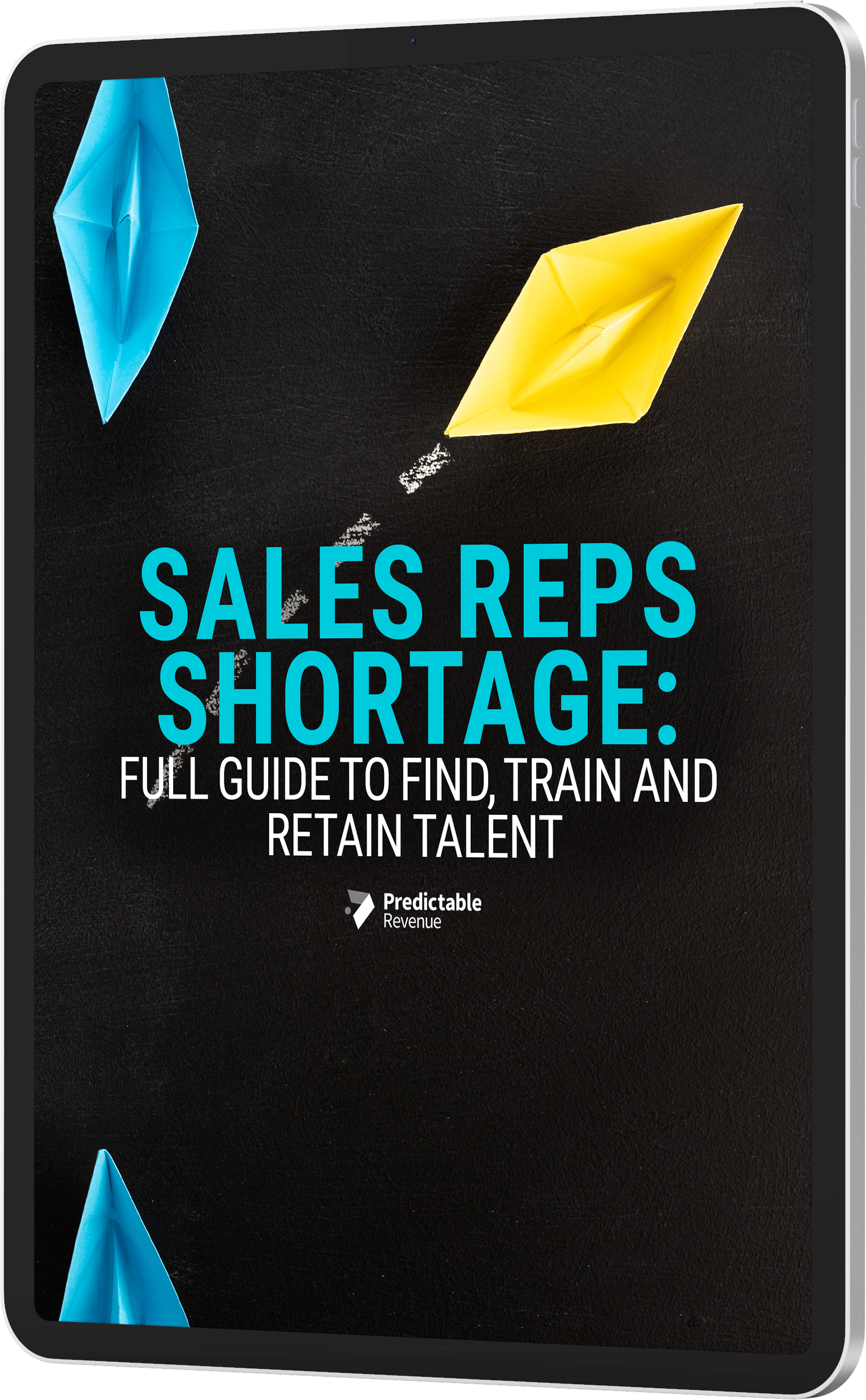
Prospecting for new customers is a time-consuming but necessary part of the sales process. If you want to keep your pipeline moving, you need consistent leads–and that means you need to hire SDRs.
The problem is, that high-quality sales reps are in short supply these days. Between a global pandemic, low employee satisfaction, and an ultra-competitive job market, it’s much harder than it used to be to build a sales development team.
In this guide, we’re sharing everything you need to know about not only hiring great SDRs but also how to train them for success and retain your best talent long-term. Steal our exact interview process, use our proven job description template, and learn how to motivate your reps beyond monetary compensation.

GET YOUR FREE COPY!
EXCERPT
Building Your First Sales Team
When companies are growing their sales team for the first time, there’s a lot of debate around when to hire, who to add to the team first, and what to look for in your first SDRs.
You remember Goldilocks and the Three Bears. According to Predictable Revenue podcast guest Joseph Trodden, making your first sales hire as a founder is a bit like Goldilocks’ journey–meaning you probably won’t get it right the first time.
There are a few reasons why founders struggle with those initial hires, and in this article, we’ll break down those obstacles so you know exactly what to avoid.
Common Hiring Mistakes
First, many entrepreneurs are unclear on what job they’re hiring for. They look at sales as a whole and they haven’t broken down the process enough to determine whether they want someone taking over lead gen, establishing partnerships, or strategy. Before you hire anyone, you need to have a specific task for them in mind.
Second, founders don’t know their own strengths, what specific market they’re going to target, and where exactly this new hire would operate. Therefore don’t know if they should hire a junior SDR to pick up the grunt work, or someone senior with more experience.
And finally, once they’ve brought someone on, founders don’t provide their new SDR with the right instructions. They don’t detail the parameters within which they want the salesperson to operate, the sales process and its components, or the exact degree of latitude they are going to afford this person.
In every instance, expectations aren’t being properly set for this first hire. And without those expectations, they’re destined to fail.
Equipping Your Reps For Success
Figuring out the level of hire is key. To determine which gaps you need to fill, it’s as simple as deciding what you hate to do most. What do you excel at, and what is a poor use of your time?
If you’re hiring a junior rep, you need to equip them with adequate tools and training. It’s easy to decide to drop someone into the deep end and have them take over prospecting, but until that process is documented, someone without experience won’t be able to pick it up. This is where a sales playbook comes in handy.
Next, you need to understand exactly what the position is that you’re looking to fill and be clear on what the expectations are. Think in organizational terms and ask yourself these questions:
- What does the sales function look like now?
- What would it mean to have someone come in to take these specific things off your plate?
- What would that person look like?
- What are the consequences of putting this person in?
Whomever you decide to bring on, make sure you’re hiring for right now. You don’t want to make the mistake of bringing someone on because you think they’ll be great in six months.
You also don’t want to make the mistake of hiring someone and promising them a role in the future that you don’t need yet. Be honest about what you’re looking for in the role, and be transparent about projections and timelines.
Your Second Hire
So you’ve made your first hire, and it’s working. Who do you bring on next? Consider leaning on your first hire to help make the decision.
They add a different perspective to your own, and listening to your people’s perspectives is an essential skill you’ll need to learn as you graduate from solopreneur to a true organization.
Ask your first hire these questions:
- Who should we hire? Why?
- What would this enable us to do?
- What would this enable you to do?
- What would the impact be across the business?
Failure is not the enemy
Don’t be afraid to let the people you hire fail. Empower your team to make their own decisions, rather than trying to call every single shot. Letting your people do some things you disagree with will help them learn for themselves, and in the long term, build a positive team culture.
Handing Over The Reins
Making the first sales hire is a key point in your company’s growth. A lot of entrepreneurs get it wrong the first time, taking a route like Goldilocks and trying a bit of this and a bit of that before they find the right person.
But if you focus on defining which gaps you need to fill, hiring at the appropriate level, and setting clear expectations, you’ll transition through the Goldilocks phase to find that “just right” hire a little bit quicker.
Copyright © 2021 Predictable Revenue. All Rights Reserved.